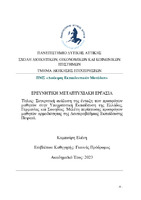| dc.contributor.advisor | Yannas, Prodromos | |
| dc.contributor.author | Καμπούρη, Ελένη | |
| dc.date.accessioned | 2023-07-04T12:01:15Z | |
| dc.date.available | 2023-07-04T12:01:15Z | |
| dc.date.issued | 2023-06-21 | |
| dc.identifier.uri | https://polynoe.lib.uniwa.gr/xmlui/handle/11400/4576 | |
| dc.identifier.uri | http://dx.doi.org/10.26265/polynoe-4414 | |
| dc.description.abstract | Η Ελλάδα, η Γερμανία και η Σουηδία επιλέχθηκαν για τη συγκεκριμένη μελέτη διότι είναι από τις χώρες που υποδέχονται μεγάλο αριθμό μεταναστών και προσφύγων σε σύγκριση με τις άλλες ευρωπαϊκές χώρες. Επιπλέον, οι τρεις αυτές χώρες προσπαθούν να εφαρμόσουν τις πολιτικές της Ευρωπαϊκής Ένωσης που αφορούν τους πρόσφυγες μαθητές στο πλαίσιο της πολυπολιτισμικής εκπαίδευσης. Ωστόσο, διαπιστώνονται διαφορές στον τρόπο εφαρμογής και προσέγγισης των πολιτικών αυτών, που οφείλονται κυρίως στη δομή λειτουργίας των εκπαιδευτικών συστημάτων (αποκεντρωμένο, συγκεντρωτικό), στην εμπειρία των χωρών στην εφαρμογή ορισμένων πολιτικών, καθώς και στις οικονομικές, κοινωνικές και πολιτισμικές συνθήκες της εκάστοτε χώρας.
Στη συγκεκριμένη εργασία διερευνάται ο τρόπος αντιμετώπισης διαχείρισης της ένταξης των προσφύγων στο εκπαιδευτικό σύστημα αυτών των κρατών, ιδιαίτερα κατά την περίοδο 2015-2023 στις 3 χώρες της Ε.Ε., την Ελλάδα, την Σουηδία και την Γερμανία, ενώ θα δοθεί έμφαση στο ιδεατό μοντέλο εκπαίδευσης. Καθώς η κοινωνία τα τελευταία χρόνια εμπεριέχει έντονα το στοιχείο της διαφορετικότητας, η ανάγκη για σεβασμό και αποδοχή της πολυπολιτισμικότητας είναι ιδιαίτερα σημαντική.
Πιο συγκεκριμένα, παρουσιάζονται οι εκπαιδευτικές πολιτικές για τη διαχείριση της πολυπολιτισμικότητας στις σχολικές μονάδες της Ελλάδας, της Γερμανίας και της Σουηδίας. Τέλος, επιχειρείται συγκριτική ανάλυση, της Ελλάδας με τις χώρες αυτές ως προς τον βαθμό ένταξης των προσφύγων, εφαρμογής της διαπολιτισμικής εκπαίδευσης και της διαχείρισης της πολιτισμικής ετερότητας στο εκπαιδευτικό τους σύστημα. Η μέθοδος που ακολουθήθηκε είναι η βιβλιογραφική επισκόπηση, σε ότι αφορά την εκπαιδευτική πολιτική που εφαρμόζουν οι εξεταζόμενες χώρες, ενώ για τη Μελέτη Περίπτωσης της Δ.Δ.Ε. Πειραιά εφαρμόζεται ποσοτική έρευνα. | el |
| dc.format.extent | 91 | el |
| dc.language.iso | el | el |
| dc.publisher | Πανεπιστήμιο Δυτικής Αττικής | el |
| dc.rights | Αναφορά Δημιουργού - Μη Εμπορική Χρήση - Παρόμοια Διανομή 4.0 Διεθνές | * |
| dc.rights | Attribution-NonCommercial-NoDerivatives 4.0 Διεθνές | * |
| dc.rights.uri | http://creativecommons.org/licenses/by-nc-nd/4.0/ | * |
| dc.subject | Διαπολιτισμική εκπαίδευση | el |
| dc.subject | Πρόσφυγες | el |
| dc.subject | Εκπαιδευτική πολιτική | el |
| dc.subject | Θεσμικό πλαίσιο | el |
| dc.subject | Συγκριτική μελέτη | el |
| dc.subject | Μελέτη περίπτωσης | el |
| dc.title | Συγκριτική ανάλυση της ένταξη των προσφύγων μαθητών στην υποχρεωτική εκπαίδευση της Ελλάδας, Γερμανίας και Σουηδίας. Μελέτη περίπτωσης προσφύγων μαθητών αρμοδιότητας της Δευτεροβάθμιας Εκπαίδευσης Πειραιά | el |
| dc.title.alternative | Comparative analysis of the inclusion of refugee students in the compulsory education system of Greece, Germany and Sweden. Case study of the refugee students in the Secondary Education in Piraeus | el |
| dc.type | Μεταπτυχιακή διπλωματική εργασία | el |
| dc.contributor.committee | Πιερράκος, Γεώργιος | |
| dc.contributor.committee | Psaromiligkos, Ioannis (Yannis) | |
| dc.contributor.faculty | Σχολή Διοικητικών, Οικονομικών & Κοινωνικών Επιστημών | el |
| dc.contributor.department | Τμήμα Διοίκησης Επιχειρήσεων | el |
| dc.contributor.master | Διοίκηση Εκπαιδευτικών Μονάδων | el |
| dc.description.abstracttranslated | Greece, Germany and Sweden, have been chosen for this study, as they are among the countries that present a large number of immigrant and refugee students compared to other European host countries. In addition, these three countries try to implement the policies of the European Union regarding refugee students in the context of multicultural education. However, there are differences in the way these policies are applied and approached, which are mainly due to the operating structure of the educational systems (decentralized, centralized), the countries’ experience in implementing certain policies, as well as the economic, social and cultural conditions of each country. In this project, we will attempt to analyze the way these countries manage the refugee integration into the education system, especially during the period 2015-2023, while we will emphasize the ideal intercultural educational model. As society strongly includes the element of diversity during the last years, the need for respect and acceptance of multiculturalism is particularly important. Specifically, the educational policies for the management of multiculturalism at school in Greece, Germany and Sweden are presented. Finally, a comparative analysis is attempted of Greece with these countries in terms of the degree of integration of refugees, application of intercultural education and management of cultural otherness in their educational system. The followed method is the bibliographic review, in terms of the educational policy implemented by the examined countries, while Quantitative research is being implemented for the Case Study of D.D.E. in Piraeus. | el |


